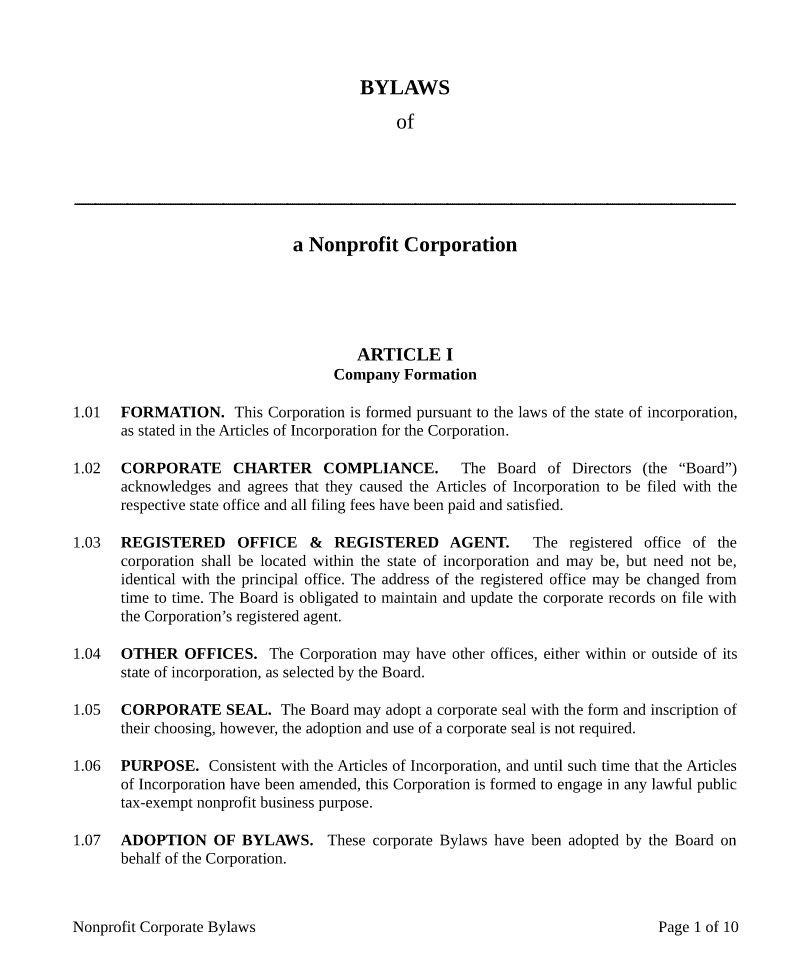Guam Nonprofit Bylaws
Your bylaws provide the organizational framework for operating your Guam nonprofit. Adopting your bylaws is a primary step in your nonprofit’s formation and will influence how you move forward. Bylaws lay out specific guidelines for internal functions such as managing board members, holding meetings, keeping records, and more. These guidelines work to protect your nonprofit from potential conflicts and legal issues by clearly describing your members’ roles and responsibilities.
Drafting your bylaws can be difficult, so we’ve provided an attorney-penned nonprofit bylaws template to get you started.
Why does a Guam nonprofit need bylaws?
Bylaws do more than set the foundation for running your nonprofit. Governmental and other third-party organizations will use your bylaws to assess the legitimacy of your nonprofit when you engage in business-related activities like applying for tax-exempt status or funding. Your bylaws will also become public record when you register your nonprofit with Guam’s Department of Revenue and Taxation.
1. Nonprofit bylaws are legally required in Guam.
According to Guam Code Annotated § 2201, all Guam corporations must adopt bylaws within one month of filing their Articles of Incorporation. Your bylaws must be signed by whoever adopts them— your founding board of directors or incorporators. You must keep your bylaws on file in your principal office and available to your members during regular business hours. Additionally, you must submit your bylaws to the Department of Revenue and Taxation, either with your initial Guam Articles of Incorporation filing or afterward with a copy of your articles attached.
2. Third parties will ask to see your bylaws.
If you choose to submit an application package for tax exemption, you’ll need to attach a copy of your bylaws for the Guam Department of Revenue and Taxation and the IRS to review. It’s also highly likely that you’ll need to provide copies of your bylaws to banks, landlords, investors, and others doing business with you.
3. Nonprofit bylaws allow you more control over your nonprofit.
Strong bylaws keep your nonprofit operating smoothly and help safeguard you from legal troubles. Your bylaws should lay out clear protocols for dealing with potentially contentious situations like removing directors and conflicts of interest. In doing so, bylaws can help your nonprofit avoid disputes between members and scrutiny from outside sources leading to lawsuits or government inquiries. Facing such legal complications may distract your nonprofit from its mission, drain its resources, and allow the government to make default ruling decisions about your organization. So, make sure that your bylaws are in place and powerful.
Want to learn more? Check out our Guide to Nonprofits.
What do Guam Nonprofit Bylaws include?
When drafting your bylaws, you should include basic information about your nonprofit and the specific rules for governing your organization. The first part of your bylaws will contain your nonprofit’s name, address, purpose, and other details. The rest of your bylaws will be dedicated to guidance on:
- announcing and holding board meetings
- voting and quorum procedures
- electing and removing board members or officers
- compensating members
- serving or receiving legal notices
- handling conflicts of interest
- keeping accounting and meeting records
- amending your bylaws
- dissolving your nonprofit
Additionally, your board or incorporators can add any provisions that apply to your nonprofit as long as they don’t contradict the law or your Articles of Incorporation.
Are nonprofit bylaws legally binding?
Yes. Your bylaws are a legally binding set of rules, and members of your nonprofit are obligated to follow them. If an employee, an officer, or a board member breaches your bylaws, severe legal consequences could arise, particularly if the government investigates your nonprofit.
Are nonprofit bylaws public record?
In Guam, all corporate bylaws are on the public record because they must be submitted to the government as part of the nonprofit registration process. You may also choose to publish your bylaws, making them easily accessible to donors, supporters, and beneficiaries. This can strengthen your nonprofit’s reputation by increasing your transparency and trustworthiness.
FAQs
Yes, Guam law requires that your initial board of directors or incorporators sign your bylaws (GCA § 2201). Signing your bylaws is also standard practice in the nonprofit world. It lends your bylaws an air of credibility and signals that your directors are all on the same page regarding your nonprofit’s mission and structure.
Yes. We recommend going through your bylaws regularly to identify areas that no longer serve your organization well and need to be changed. The procedures for amending your bylaws should be included in the bylaws themselves.
In Guam, your nonprofit’s bylaws can be adopted by either your incorporators or your board of directors at the first organization meeting for your nonprofit.
